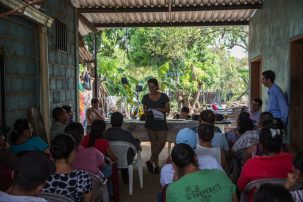Agriculture20
-

Upping Our Game: Crop Insurance Project Proves Wildly Successful
A weather index insurance tool is graduating from research project to commercial product.
-

Palm Oil in the Amazon: Threat or Opportunity?
Small migratory farming is responsible for 70% of the annual deforestation in Peru. Can palm oil address this problem and lead the change towards sustainable development in the Peruvian Amazon?
-

Bridging the Gap Between Weather and Climate
Andrew Robertson is creating a forecasting system that will help societies adapt and become more resilient to the impacts of climate change.
-

Can Soil Help Combat Climate Change?
Soil naturally absorbs a huge amount of carbon. Some scientists think we can use it to our advantage in the fight against global warming.
-

Transparency and Community Empowerment around Land Investments in Cameroon
Samuel Nguiffo, founder of Cameroon’s Centre for Environment and Development, explains how he uses OpenLandContracts.org, a unique tool created by the Columbia Center for Sustainable Investment.
-

Justine Sylvester on Land Contract Transparency and OpenLandContracts.org
The Columbia Center on Sustainable Investment speaks with Justine Sylvester of Village Focus International about land contract transparency in Laos and OpenLandContracts.org, a repository of publicly available investor-state contracts for large-scale land-based investments.
-

American Geophysical Union 2017: Key Events From the Earth Institute
A chronological guide to key talks and other events presented by Columbia University’s Earth Institute at the American Geophysical Union 2017 meeting.
-

Is There a Human Right to Land?
For people around the world, land is a source of food, shelter, and livelihoods. Given their importance, land rights are surely human rights—right?
-

Swapping Where Crops are Grown Could Feed an Extra 825 Million People
It could also reduce water stress, according to a new study that includes 14 major food crops from around the world.

By studying thousands of buildings and analyzing their electricity use, Columbia Climate School Dean Alexis Abramson has been able to uncover ways to significantly cut energy consumption and emissions. Watch the Video: “Engineering a Cooler Future Through Smarter Buildings“
